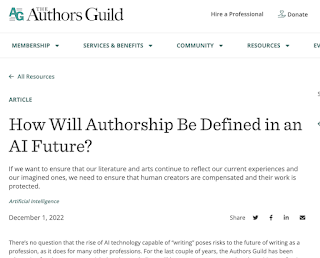Continuing this look at AI systems and their impact on those of us who create creative works for kids and teens, the Authors Guild released a statement earlier this month, How Will Authorship Be Defined in an AI Future?
In it, they look at the issue of both how AI systems are "trained" and how if those systems are learning from works that are protected by copyright, who can be held accountable for that violation of copyright?
A couple of highlights from the Authors Guild statement by Mary Rasenberger, their CEO:
“These AI-created ‘new’ works, as such, are not really new or truly creative. Rather, the AI system ingests existing works that have been broken down into data points, and then rehashes them—albeit in a very complex way.”
and
“We are confronting serious policy issues about the future of creativity: Do we want humans or AI creating our literature and other arts? As we have argued in multiple policy forums, if we want to ensure that our literature and arts continue to reflect our current experiences and our imagined ones, we need to ensure that human creators are compensated and their work is protected. AI cannot feel, think, or empathize. It lacks the essential human faculties that move the arts forward. While it is remarkable that engineers could create a “new” Rembrandt that so closely resembles an authentic one, we do not need new Rembrandts; we need new art and literature to reflect where we humans are now, and where we might be going.”
Definitely something to keep our eye on in 2023!
Illustrate, Translate, and Write On,
Lee


No comments:
Post a Comment